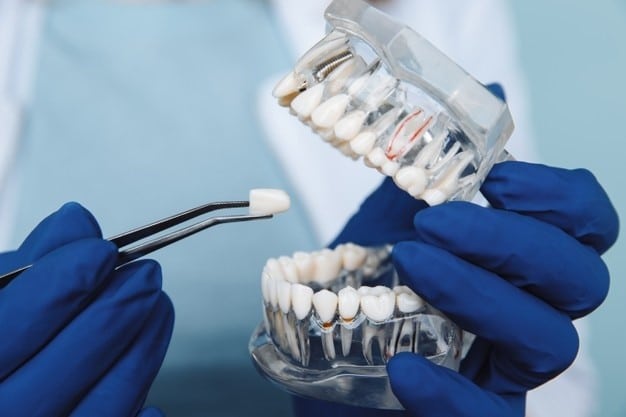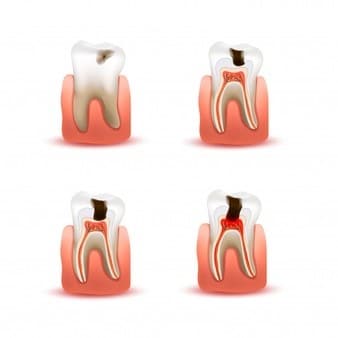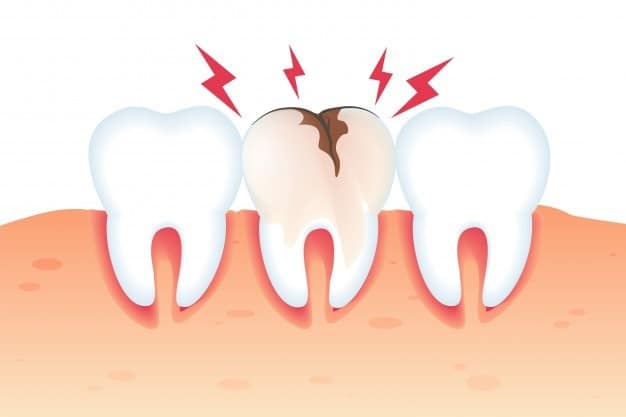Even the strongest of us can suffer from toothaches. A bad tooth is a living nightmare, it hurts every time you eat, drink, or speak. A variety of factors can cause toothache and sensitivity including poor oral hygiene, cavities, and injury.
Here we discuss major causes of toothache and what you can do about them:
Tooth Sensitivity
It is the pain that you feel in response to certain stimuli, such as having something hot or cold. Remember when you had your favorite ice cream, and it caused piercing discomfort as it hit the tip of your tooth? Or did you feel a stinging sensation in your teeth while sipping hot coffee? If you go through this pain often, you may have sensitive teeth.
But what causes tooth sensitivity?
The most prevalent cause is enamel thinning—the upper protective coating of the teeth. When this layer is removed, the nerves inside the teeth are exposed. Thinning or erosion of tooth enamel is quite common in people who:
- Grind their teeth, especially at night.
- Frequently vomit and have acid reflux.
- Eat a lot of acidic foods and drink a lot of soda.
- Use harsh chemicals on their teeth.
Other major causes of tooth sensitivity include:
- Inflammation in pulp and canals of the teeth.
- Tooth chipping and cracking.
- Poor oral hygiene.
- Drastic eating and drinking habits.
TMD Condition
Temporomandibular disorder is when you experience pain and discomfort around the jaw joint and surrounding muscles. It involves a loose hinge joint in the jaw that causes involuntary tooth grinding.
TMD has no definite cause, but it’s usually induced by a jaw injury or teeth clenching. It is commonly treated with mouth guards, anti-inflammatory medicines, and physiotherapy.
If you have a lot of pain, you can apply ice packs around the jaw. However, you should see a dentist as soon as possible.

Recent Teeth Whitening
Teeth brightening uses hydrogen peroxide gel to remove stains. The chemical is harsh on the teeth and makes them porous, hence, more prone to sensitivity.
Gum Recession
The most common reason for gum recession or abrasion is brushing too hard. Gum recession is the condition when the margin of gum tissue is damaged because of friction or injury. It exposes the root and the nerves. When you eat or drink something, the particles reach the insides of the tooth and cause discomfort. That’s how your teeth become sensitive.
You can simply use a toothbrush with soft bristles and brush gently.
Gum Infection
The rate of gum infections is increasing day by day. They often result from germs in teeth. Even minor pain and discomfort in eating or drinking might be early signs of gum infection. Dr. Silverman, of the Chandler Peace of Mind dental studio, describes it this way “A gum disease is like high blood pressure. It is usually painless and without obvious symptoms until it gets very significant. When high blood pressure remains untreated because a patient feels alright, it can lead to a serious stroke.”
Dr. Silverman adds “the same goes for untreated gum disease, patients rarely have any discomfort until the advanced stages… and by then the patient has lost 75% or more of the bone supporting their teeth, they become loose, and need to be taken out.”
Hence, you must visit your dentist before the gum infection turns into an abscess. <–

Tooth Trauma
If you have immense pain in the tooth that persists for a long time, you may have tooth trauma. Even the simplest of injuries due to falling or hitting can cause tooth fracture and tooth trauma. Previous tooth treatments that went wrong also end up leaving traumatic teeth.
You should keep in mind that lasting pain is not the only sign of trauma. Tooth sensitivity can also be one of its effects. So, consult a dentist even if you experience slight discomfort.
Sinus Infection
A bad sinus and toothache often come as a package. Especially during flu seasons, the sinuses agitate and impact the root of your teeth. Since molars are located right BELOW the sinus, they are more likely to be affected and experience frequent discomfort.
So what happens here is that allergens cause swelling of the sinus membrane, which puts pressure on the nerves of upper molars and creates a toothache. Here, you’ll need to see a doctor who can prescribe a decongestant or antibiotic. As the sinuses clear, the pain subsides.
Grinding Teeth during Sleep
If you are one of those people who grind their teeth in the night, don’t worry, you are not alone. Indeed, you may not even be aware that you are grinding your teeth.
Grinding or clenching of teeth causes enamel abrasion, tooth fracture, or even cuts the inside of the mouth. Eventually, it can lead to toothache and sensitivity.
It’s quite common in people with misaligned teeth. You should know that its treatment is very easy. Your dentist might prescribe a tooth-guard or perform some correctional procedures.
A recent Filling or Drilling of a Tooth
Some dental treatments such as filling or drilling may cause temporary irritation, but these get resolved quickly. Chewing or drinking with a freshly treated tooth can also cause discomfort. So, wait until prescribed by your dentist before using the tooth.
Though a painkiller quickly relieves most of this discomfort, if it persists for an extended period, you should consult your dentist again.
Cracked Tooth
As the name suggests, a cracked tooth will cause pain whenever you touch it, especially if you bite a hard object or consume something hot or cold. A tooth crack is probably the most common form of tooth injury. Even modest forces such as a face injury, clenching teeth, or any sudden shock on the teeth can make them crack.
At our restorative dentistry practice in Chandler, we offer multiple ways to cure cracked teeth. If you think you may have a cracked tooth, consult a dentist as early as possible.

Cavities and Decay
Tooth decay is the most common dental problem. Plaque builds up on the teeth and releases acid. This acid causes decay and if left untreated can lead to tooth decay or even dental abscess. Initially, it doesn’t cause a lot of problems and often goes unnoticed. However, with time it can advance and turn into a cavity.
This is where the actual problems kick in- enamel erosion, exposed nerves, sensitivity, and toothache. An untreated cavity can also cause severe problems such as pyorrhea, gum disease, Or lead to life threatening infections that can make breathing difficult or spread to the brain.
The simplest way to prevent cavities is frequent and thorough cleaning of the mouth. Brush twice a day, use floss, use a mouthwash, and don’t smoke. But if you’ve already got a cavity, only a dentist can cure it.
Whatever the cause of your toothache, Peace of Mind Dental Studio in Chandler, AZ understands and heals your pain.
Peace of Mind Dental Studio specializes in general dentistry and is dedicated to offering personalized, integrative, and relaxing dental care for the entire family. POM Dental Studio employs innovative technology to deliver the most effective treatment solutions. Dr. Jeremy and Elissa Silverman operate this Chandler restorative dentistry practice with the utmost of Care. Visit: https://www.pomdental.com/book-appointment/


